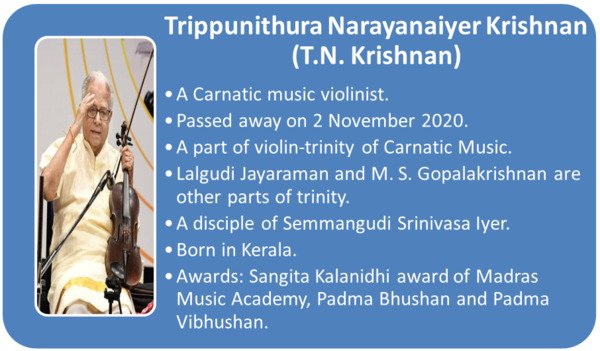Daily Current Affairs and GK | 4 November 2020

Main Headlines:
- 1. Priyanca Radhakrishnan, first ever Indian-origin minister of New Zealand.
- 2. WWF Water Risk Filter shows 30 Indian cities among 100 cities that will face increase in water risk by 2050.
- 3. Carnatic music violinist, T.N. Krishnan passes away.
- 4. China halted the world’s biggest IPO of Ant Group’s giant.
- 5. Government provided 2.5 crore rural homes tap connection under the Jal Jeevan Mission (JJM).
- 6. Jwala Gutta Academy of Excellence launched in Hyderabad.
- 7. Panna Tiger Reserve in Madhya Pradesh declared as UNESCO biosphere reserve.
- 8. Annual Political Dialogue of India and GCC Troika organized virtually.
- 9. Government data reveals that India’s exports dip 5.4% in October.
- 10. MIT students won a global hackathon award organized by NASA.
- 11. Six Women startups have won COVID-19 Shri Shakti Challenge.
Happy February get 35% Off
Use Coupon code FEB26
1. Priyanca Radhakrishnan, first ever Indian-origin minister of New Zealand.
- Priyanca Radhakrishnan became the first-ever Indian-origin minister of New Zealand.
- She was born in India and later went to New Zealand for further education.
- She was elected first as a Member of Parliament from Labour Party in September 2017.
- New Zealand:
- It is an island country located in the Pacific Ocean.
- Capital: Wellington
- Current Prime Minister: Jacinda Ardern
- Currency: New Zealand dollar
- It is a constitutional monarchy with a parliamentary democracy.
- The Constitution of New Zealand is not codified.
- Queen is the head of the State, who is represented by the governor-general.
2. WWF Water Risk Filter shows 30 Indian cities among 100 cities that will face increase in water risk by 2050.
- WWF Water Risk Filter, an online tool to evaluate water-related risks, has shown that 30 Indian cities are among 100 cities that will face increase in water risk by 2050.
- Among 30 Indian cities that will face increase in water risk by 2050, Jaipur (45th), Indore (75th) and Thane topped the list. Mumbai, Kolkata, Delhi are also part of the list.
- Out of the 100 cities that will face increase in water risk by 2050, 50 are from China. Nearly 350 million people live in these cities.
- Egypt’s Alexandria has topped the list of 100 cities that will face increase in water risk by 2050. Mecca in Saudi Arabia, Tangshan in China, Saudi Arabia’s Ad-Dammam and Riyadh follow Alexandria.
- Sierra Leone’s Freetown, China’s Taiyuan and other cities found lace among bottom 10 cities in the list of 100 cities that will face increase in water risk by 2050.
- Beijing, Jakarta, Johannesburg, Istanbul, Hong Kong, Mecca and Rio de Janeiro are also included in the list of cities that will face increase in water risk by 2050.
- The population or number of people living in in high-water risk areas will possibly increase from 17% in 2020 to 51% by 2050.
- The report also talks about efforts to revive Bashettihalli wetland in Bengaluru and Sirpur Lake in Indore.
- Water Risk Filter:
- It was launched in 2012. It was co-developed by WorldWide Fund for Nature (WWF) and German Development Finance Institution DEG.
- It helps both investors and companies in evaluating water risks that their operations and investments face around globe.
3. Carnatic music violinist, T.N. Krishnan passes away.
- Carnatic music violinist, Trippunithura Narayanaiyer Krishnan (T.N. Krishnan) passed away on Monday.
- T.N. Krishnan was thought as a part of violin-trinity of Carnatic Music. Lalgudi Jayaraman and M. S. Gopalakrishnan are other parts of trinity.
- He was a disciple of Semmangudi Srinivasa Iyer. He was born in Kerala.
- He has won Sangita Kalanidhi award of Madras Music Academy, Padma Bhushan and Padma Vibhushan.

4. China halted the world’s biggest IPO of Ant Group’s giant.
- Ant Group’s highly anticipated IPO has been suspended by China from listing at Shanghai and Hong Kong stock exchanges.
- This 37$billion USD IPO has been suspended just two days before its debut.
- This decision has been taken after the meeting of Ant Group’s senior executives and China’s top financial regulators.
- Jack Ma, the co-founder of Alibaba, owns 8 % of Ant Group’s shares and 50 % voting rights of the company.
- Initial public offering (IPO): It is the process when the first time a company issues shares to the public to raise capital.
- In India, SEBI regulates the entire process of Investment via an IPO.
5. Government provided 2.5 crore rural homes tap connection under the Jal Jeevan Mission (JJM).
- According to the government, 2.5 crores rural households have received tap connections under the Jal Jeevan Mission since 2019.
- Data reveals that Telangana and Bihar have emerged as the leading states in this mission.
- JJM aims to provide a tap connection to every rural household by 2024.
- Goa is the first state to provide a tap connection to every rural household.
- Telangana topped under this mission in providing connection. It has provided 38 lakh tap connection.
- Bihar is in second place, it has covered 54.38% of the rural households.
- Some other best performing states under this mission are Goa (24.3 %), Mizoram (23.19 %), Haryana (21.12 %), Manipur (20.78 %), Himachal Pradesh (19.99 %),
- West Bengal is at the bottom in providing tap connection. It has just covered 1.44 rural households under this mission.
- The other states which are in the bottom list under this Mission are Karnataka (1.4 %), Kerala (1.78 %), Ladakh (2.25 %), Assam (3.39 %), Jharkhand (3.36 %) and Rajasthan (3.69 %).
- Jal Jeevan Mission:
- This mission was announced in August 2019.
- The main objective of the mission is to provide a piped water supply to all rural households by 2024.
- Ministry of Jal Shakti is the nodal agency for this mission.
6. Jwala Gutta Academy of Excellence launched in Hyderabad.
- Jwala Gutta Academy of Excellence has been launched at Gachibowli in Hyderabad, Telangana.
- The academy will focus on badminton and other sports including cricket and swimming.
- The academy has been set up by World championship bronze medalist and India’s badminton player, G. Jwala herself.
- Dronacharya awardee badminton coach Syed Mohammed Arif is heading the panel for recruitment of coaches for the academy.
7. Panna Tiger Reserve in Madhya Pradesh declared as UNESCO biosphere reserve.
- Panna Tiger Reserve in Madhya Pradesh has been declared as UNESCO biosphere reserve and included in UNESCO’s World Network of Biosphere Reserves.
- On 28 October 2020, 25 new sites have been added by UNESCO’s Man and the Biosphere (MAB) programme to the World Network of Biosphere Reserves.
- Now, UNESCO’s World Network of Biosphere Reserves has 714 biosphere reserves located in 129 countries. Out of these, 21 are transboundary sites.
- Panna tiger reserve has increased the number of tigers from nearly zero to nearly 50 in a decade.
- UNESCO adds few sites to the World Network of Biosphere Reserves and removes others from the network every year.
- Panna Tiger Reserve:
- It is located in the Panna and Chhatarpur districts of Madhya Pradesh.
- It was set up in 1981. In 1993, Panna national park was declared a tiger reserve.
- It lies in the Vindhayan hills in northern Madhya Pradesh. It has dry deciduous forests.
8. Annual Political Dialogue of India and GCC Troika organized virtually.
- Annual Political Dialogue of India and GCC Troika have been organized virtually on 3 November.
- Indian delegation was led by External Affairs Minister Dr. S. Jaishankar. Secretary-General of GCC, Bahrain’s Minister of Foreign Affairs and UAE’s Minister of State for Foreign Affairs represented GCC at Troika level.
- During the dialogue, India-GCC ties were reviewed. The leaders also praised the growth in ties in the last few years.
- GCC expressed happiness over India’s inclusion in United Nations Security Council (UNSC) as a non-permanent member for two years from January 2021.
- Gulf Cooperation Council:
- It was formed in 1981.
- It has six members. These are Bahrain, Kuwait, Oman, Qatar, Saudi Arabia and the United Arab Emirates.
- Its headquarters are located in Riyadh, Saudi Arabia.
9. Government data reveals that India’s exports dip 5.4% in October.
- Government data reveals that India’s exports declined 5.4% in October to $24.82 billion due to the dip in shipments of petroleum products, gems and jewellery, leather, and engineering goods.
- India’s merchandise export falls from USD 26.23 billion to USD 24.82 billion; it shows a decline of 5.4 %.
- Indian import has also fallen to 11.56% to USD 33.6 billion in October. The Trade deficit of India has narrowed down to USD 8.78 billion due to a fall in the import.
- Commodities that have recorded negative growth are petroleum products (53.30 %), cashew (21.57 %), gems and jewellery (21.27 %), leather (16.69 %), etc.
- Rice, oil meals, iron ore, oil seeds, carpet, pharmaceuticals, spices, cotton and chemicals commodities have recorded positive growth.
- Federation of Indian Export Organisations (FIEO) president said that the decline in export was mainly due to the huge container shortage and hike in sea freight.
- Top Exports and Imports of India:
- The top exports of India are Refined Petroleum, Diamonds, Packaged Medicaments, Jewellery, and Rice.
- The top imports of India are Crude Petroleum, Gold, Coal Briquettes, Diamonds, and Petroleum Gas.
10. MIT students won a global hackathon award organized by NASA.
- A team of Manipal Institute of Technology students has participated in the ninth International NASA Space Apps Challenge.
- This hackathon was organized by NASA Incubator Innovation Program in partnership with ESA, JAXA, CSA ASC in October.
- In this hackathon, many teams from worldwide have participated in different virtual centres.
- MIT students have bagged the best People Choice award with competing over 250 registered teams.
- MIT students’ team under the name of #Runtime_Terrors has developed a solution to aid interstellar travellers, astronauts, and shift workers in scheduling their lifestyle and sleep scheduling.
- They have also developed a design of sleep-inducing mask for real-time health monitoring and sleep tracking.
11. Six Women startups have won COVID-19 Shri Shakti Challenge.
- Six startup firms run by women have bagged the COVID-19 Shri Shakti Challenge award instituted by MyGov in partnership with UN Women.
- The COVID-19 Shri Shakti Challenge was launched in April 2020 to encourage women-led startups to develop innovative solutions that can help in the fight against COVID-19.
- It was implemented in two stages: Ideation stage and Proof of Concept (PoC) Stage.
- This challenge has been responded by 1265 startups in which 25 startups were selected for presentations to the Jury. These startups were evaluated based on innovation, usability, relevance and impact of their idea on society.
- After review, 11 startups were shortlisted for the mentorship and 75000 INR was provided to further develop their ideas.
- In these finalists, three startups are selected as the winner of this challenge, and the other three were selected as Startups with ‘Promising Solutions’.
- Winners of this challenge are Dr. P Gayatri Hela, Romita Ghosh and Dr. Anjana Ramkumar and Dr. Anushka Ashokan.
- Winners under Startups identified as ‘Promising Solutions’ are Vasanthi Palanivel, Shivi Kapil, Jaya Parashar and Ankita Parashar.
- Reward of Rs 5 lakh was given to winners and Rs 2 lakh was to startups chosen for their promising solutions.





 3 November 2020 Current Affairs
3 November 2020 Current Affairs 








Comments